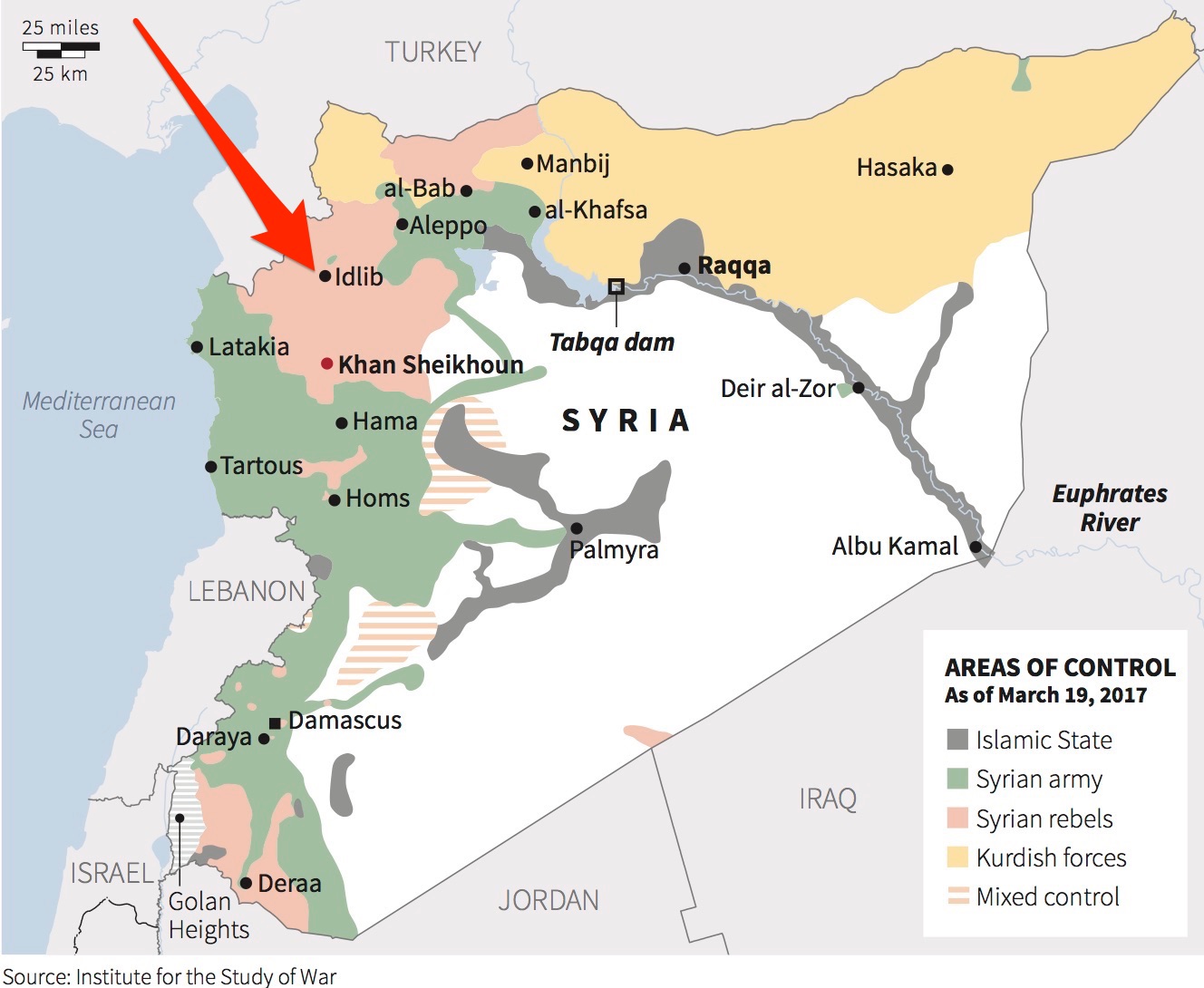One of the most devastating chemical attacks to take place during the six-year civil war in Syria left dozens of people – including many children – dead or critically injured in the rebel-held province of Idlib on Tuesday.
At least 70 people died in what activists and Western leaders have described as an airstrike conducted by the Syrian military in the northern town of Khan Sheikhoun on Tuesday.
The US launched a salvo of 59 cruise missiles on Shayrat airfield and nearby military infrastructure controlled by Syrian President Bashar Assad, at dawn local time on Friday in response to the attack.
While the United Nations and Western leaders have quickly condemned the chemical weapons attack, the war that has left more than 450,000 Syrians dead and 12 million permanently displaced shows no sign of ending soon. Less than 24 hours after the chemical attack, more airstrikes reportedly started hitting the same part of town.
Here’s what happened this week and how the conflict escalated to this point.
Early on Tuesday, a military plane dropped a bomb on a building in the center of rural Khan Sheikhoun. Victims and medical professionals in the area said the large cloud of smoke caused many residents to pass out.

Source: BBC
The Syrian Observatory for Human Rights first said at least 58 people, among them 11 children, passed out from inhaling the toxic chemicals released into the air. Many others died later after the initial exposure.

Source: The Associated Press
Minutes later, three strikes hit the center of town, exploding in the roads and surrounding buildings.

Source: CNN
Doctors from the surrounding areas said over 500 people were rushed to clinics. "Most of the hospitals in Idlib province are now overflowing with wounded people," Mounzer Khalil, head of Idlib's health authority, told Reuters.

The chemical, which the World Health Organization said could be a nerve agent, caused many people to choke, foam at the mouth, and writhe in pain before passing out. "It was like a winter fog," Mariam Abu Khalil, a teenager who saw several residents of her hometown die, told The New York Times.

Sources: WHO, New York Times
In the last week alone, two other chemical attacks were reported near Idlib province, which is held by rebels opposing Syrian President Bashar Assad's regime.

Source: ABC News
Both international and local groups have said Assad's forces carried out the strike. Amid worldwide outrage over the attack, the Syrian government still "categorically rejected" any responsibility.

On Wednesday, Western and Middle Eastern leaders observed a moment of silence at a Brussels conference aimed at finding solutions to end the war. The chemical attack added extra urgency to the discussion.

Source: European Union External Action
The deadliest war of the 21st century started when Assad ordered the killing and imprisonment of protesters amid the Arab Spring in 2011. The conflict has escalated to involve Western powers and Russia, and more than 450,000 Syrians have been killed in sieges, military strikes, and air bombings.

Source: Al Jazeera
International groups have accused the Syrian government of using chemical attacks several times. The deadliest one took place in 2013 when aerial drops of the nerve agent sarin killed over 1,000 people near the country's capital.

Source: BBC
While the West has supported the rebels, Russia started providing support to Assad's government in 2015. Both the US and Russia have deployed airstrikes in the warring areas.

Source: BBC
A 2017 United Nations report found that both sides committed war crimes in the fight for Aleppo at the end of 2016. Civilians were killed and critically injured in the crossfire.

Source: United Nations
The civil war has spurred the largest humanitarian conflict since World War II, with more than 5 million Syrians seeking refugee status in other countries. Nearly half of Syria's citizens have been forced to flee their homes.

Source: World Vision, Unicef
The war has had an especially devastating effect on Syrian children. Many have been killed, recruited as soldiers, or stranded in refugee camps without adequate access to food.

Source: NPR
The Trump administration has offered mixed messages on possible ways to resolve the Syrian conflict. Breaking with the Obama administration, the US ambassador to the UN, Nikki Haley, has said that forcing Assad from power is no longer a priority.

Source: Reuters
President Donald Trump condemned the attack and has previously urged against using military action in Syria. It's unclear whether the US or Russia will strike back against the perpetrator of the chemical attack.

Source: Business Insider
In the early hours of April 7, Trump launched a salvo of 59 cruise missiles on Shayrat airfield and nearby military infrastructure controlled by Assad in response to the attack.

Source: Business Insider
"It is in this vital national security interest of the United States to prevent and deter the spread and use of deadly chemical weapons," said Trump shortly after ordering the attack. This was the first international attack on the Syrian government during six years of civil war.

Source: Business Insider
Continuing to support Assad's government, Russia condemned the strikes and said that it would "inflict major damage on US-Russia ties." The Syrian War has often been called the latest proxy war between the West and Russia.

Source: Reuters, Business Insider and US News

